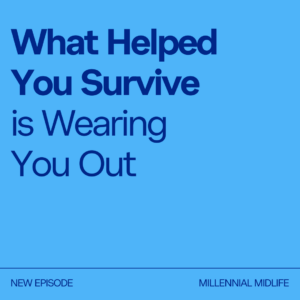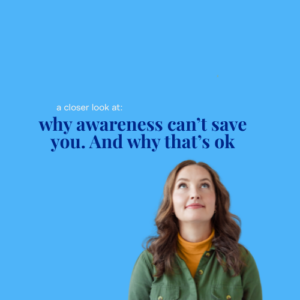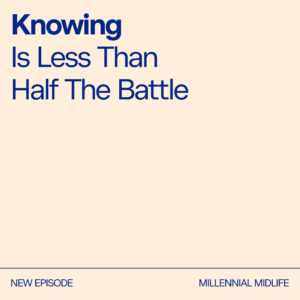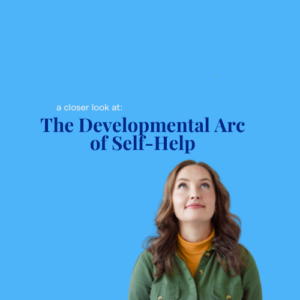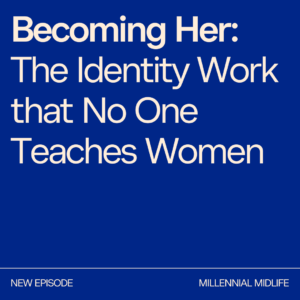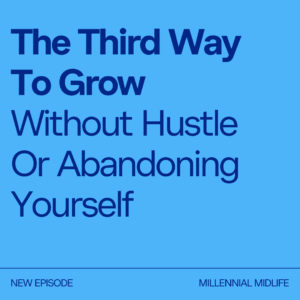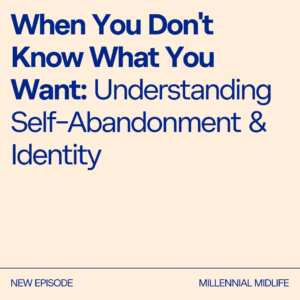Cecelia Baum Mandryk (00:01.862)
and welcome to Calmer Conversations. I’m Cecilia, your host. Today we’re going to talk about noticing again. If you listened to last week’s episode, I said that there was going to be a continuation. And so today we’re going to dive into noticing as a tool. I am using not my normal headphones and normal microphones. So if the quality is a little bit different, I apologize. I’m doing this on vacation.
and I didn’t think I thought to bring many, many, many things for toddlers and for kids. But I did not think to bring my podcasting microphone. So I’m here. And last week, I talked about how oftentimes people find me and they find me when they when therapy or some other kind of mental health work or something they have been doing in personal development was working and all of sudden it’s not working anymore.
I will also say that sometimes people find me when something else they’re doing like willpower used to be working and it is no longer working. That’s a whole nother discussion. the noticing I talked about last week is noticing when you’re kind of in it, when you’re like in a spiral, when it feels like you’re in, like you’ve had the same conversation in your group chat for weeks on end, or you’ve had the same boss over and over again, or you’re in the same relationship over and over again, or
The thing I specifically talked about last week was it feels like you’ve had the same therapy session over and over again. And the therapy that used to feel really powerful and like it was transformative in your life, because it is, all of a sudden feels kind of flat. It feels like it’s not getting what you need. You feel like you’re stuck in some kind of rut. And that noticing is really powerful and it can perhaps help you find somebody like me or something different, but it isn’t always the thing that helps you change, right? So the awareness sometimes that you get from something like therapy,
is not always the awareness that will help you start to make things different in your life. So I think the example that I gave when I recorded the episode, was that it’s like, you notice that you’re frustrated when your partner does something.
Cecelia Baum Mandryk (02:14.06)
And at first it’s really powerful to be able to say this out loud to another human being, because maybe you’ve never said it out loud to another human being. so therapy is really great because you say it in a safe environment and somebody hears you and validates your feelings. But then you keep saying it over and over again, and it doesn’t feel like anything is changing, right? You’re still in the same cycle. And so that kind of noticing again, powerful to be able to get it out in front of another person, powerful for somebody else to hear it for you to validate your feelings. And then what do you do?
How do you use noticing as a tool to go forward? Because if you’re not new to my world, then you know that noticing is a big tool that I help people gain a muscle, that I help you kind of strengthen yourself. And the noticing that I’m talking about that we start to use, that you start to use when you move into this kind of different world of sort of switching, is instead of noticing, I feel frustrated when my partner does this, we start to move it even more internal. So you’ve already identified an emotion, which is really powerful.
But then I ask you to start taking responsibility for how you feel in your life and in your own brain. And this isn’t to let your partner or your boss or that toxic friend off the hook. It’s not to like give them a free pass to be a jerk in your life. So you can start to see how you are creating the same situation around you over and over again. So use that example if it feels like you’ve had the same boss at like the last five jobs or your friendship
circle cycles start doing the same thing or you always have the same kind of partner in your life or whatever it is that it keeps kind of repeating itself. And so we want to start to know how am I creating this for myself and how could I start to feel different in the situation that I’m in. So if I am living with this person with this partner, if I am in this place, how can I start to change how I am and who I am
so that I can feel different. And this is an entirely different kind of noticing. So it starts to bring the noticing a little bit more internal or a lot more internal. And really one of the most powerful things you start to do is you start to notice your own patterns. And it’s not just your own habit patterns of things you’re doing, but also the patterns of what you’re saying and relatedly how you’re feeling, right? And so one of these things is usually the
Cecelia Baum Mandryk (04:38.222)
the door in. for some of us, it’s that we notice that we’re having a glass of wine in front of the TV. For other people, it might be we notice we’re feeling really frustrated. For somebody else, so it could be an action, it could be a thought, it could be an emotion. You want to start to notice that. And then you want to start to ask some questions, right? So okay, I notice that every time somebody asks me something, I start to feel really antsy and like I want something sweet.
or I start to feel really indignant in that moment. so somebody else, the circumstance in coaching, and we’ve talked about this before in other episodes, but we’ll bring it in here too, is the thing in when we’re starting this kind of noticing, we’re taking everything that happens outside of us as neutral. So it’s neither good nor bad. And we can get into that in terms of like people around you and boundaries and whether they’re in your life. Those are all valid questions and things that come up. But for the…
purpose of this episode, the thing or the thing that your boss just said, the thing that your partner just did, the thing that’s that is outside of you is neutral. Then your noticing starts to turn into you. What is the thought pattern that I’m having right now that is contributing to me feeling antsy or frustrated or anger or indignant? What is the emotional pattern that’s happening within me?
and I start to get to know those. I understand, and I’ve used this before, I understand the lines of code in my own brain. Because until I understand the lines of code in my own brain and the programming of my nervous system, it is very hard for me to show up in a situation differently and get different results. And so that initial awareness that I got from…
from something like therapy can be really powerful because maybe I already am starting to tune into myself. But I think where the difference starts to lie is that instead of paying attention to what the other person is doing that’s making you feel a certain way, what we’re asking that we’re bringing the noticing to a different place. What is it that I am saying in my own head? What is the line of code in my own head that is keeping me feeling a certain way?
Cecelia Baum Mandryk (06:58.488)
that is keeping me doing certain things. This noticing is different. This noticing is like the keys to the kingdom because when we’re only focused on the external and what other people are doing or what’s happening around us and how it makes us feel, again, those are super powerful because it’s really good to know how you feel. It’s really good to know that you’re angry at something, that something pissed you off.
But that alone doesn’t bring change. That just lets you know, okay, there’s something outside of me that’s quote unquote triggering me, right? I have a trigger. But really, the trigger is a thought you have about something that’s happening outside of you. There’s a difference there. And so the noticing has to become internal because it’s the internal that allows you to change how you feel, what you think, or know what you think and feel, right? So you feel angry at some injustice. That’s really powerful.
But when you start to know the thought you have about that injustice, not even that you’re trying to get the anger to go away, but you’re trying to really understand it and regulate your nervous system so that you can then start to act from a place of power. So the two keys here are understanding what’s happening within your own brain, those lines of code that you’re having, what’s happening within your own nervous system, right? So you’re understanding how you talk to yourself, how you respond when somebody outside of you does something or says something.
When you make a mistake, you say, I’m so stupid. When somebody comments on your clothes, you say, I’m not attractive, or I need to be attractive to feel happy in life, right? You start to pay attention to these patternings, these lines of code that your brain are telling you, these truths that your brain is telling you, that we kind of just take for granted. Your brain says these things all the time, and because they’re so habitual, they are these neural pathways that you have, and they come up over and over again.
And so you don’t notice that you’re saying them to you, but they’re the most important things to become aware of because until you change those, you cannot feel differently in your life. And so much of what we do in the coaching room is me helping you see what your brain is actually telling you, because it is very hard to see the forest for the trees, right? It is very hard for most of us to understand what our brain is actually telling us. So we don’t know.
Cecelia Baum Mandryk (09:15.764)
that we have a belief, for instance, that we can control our partner and so that we can create the exact same situation we have this belief I should be able to control him. We don’t know that we have that line of code running in our brain. And so that’s what keeps us frustrated all the time because we can’t control their behavior. Right. And until you know that line of code, then then you cannot work with your brain to change it. And the truth is you can’t control somebody else in that situation. Right. And so if you have you’re walking around with that belief, you’re always going to be a friend.
feel frustrated with your partner no matter what they do. And this is where I think the therapy thing again starts to feel like it can feel really tough because you can go and you can say, okay, they’re frustrating me because they’re doing this. And we think the solution is for them to do something different. But if that is the route we take, oftentimes then there’s just something else they have to fix and then something else they have to fix. And we’re always looking outside of us to be perfect for everything outside to be perfect so that we can feel good on the inside.
and really truly the noticing that I’m talking about here is noticing, okay, when all of this is happening, what’s going inside on inside of me so that I can start to create happiness within me. I can start to create feelings of peace or empowerment or whatever it is that I want around something so that I can work in a way that I want to work. Okay, so those two different noticing, it’s like noticing what’s outside of me and how that impacts me versus what’s noticing inside of me.
and how that impacts me. once I think the outside one again is so powerful, said in the last episode, therapy can be transformative and life-changing for so many people and it’s so necessary. And oftentimes we kind of move along this mental health continuum and we get to a point where, okay, we’ve noticed all that. We recognize that we can actually change it to the point so we feel good in our life. Like there’s still these things or we’re still in these patterns and we want to change the patterns. And then we have to start to turn.
the noticing more internal, specifically with the thoughts you’re having, with those beliefs that keep coming up with the truth that your brain is telling you so that you can shift and change them. And when you shift and change them and start working with them and start regulating your nervous system, that’s when you start to really start notice patterns changing in your external life. Okay. I hope that this was helpful. I see it as such a key crucial difference when you’re moving forward.
Cecelia Baum Mandryk (11:42.782)
with personal development, with trying to feel different, with your own mental health. And so if you feel like you’re in a place where you’ve been stuck and you’ve done a of this external noticing, but you’re ready to do something different, then get in touch with me. Come join the Life Lab. Come start doing this work. People are having such amazing transformations in there. They’re feeling different. Again, been in therapy for years, have done more in six months or a year than they feel like they’ve done in the last couple years in therapy, because we kind of get to that place sometimes where there’s diminishing returns. Okay.
Thank you so much for tuning in. I’d love to hear from you. Come say hi somewhere. Leave a review if you like this episode or any of the other ones, and I will see you the next time I see you. All right, bye.





